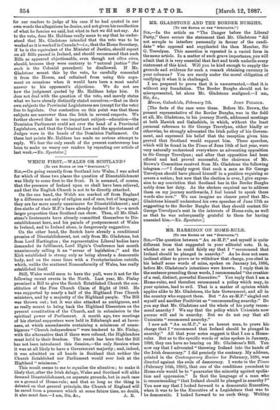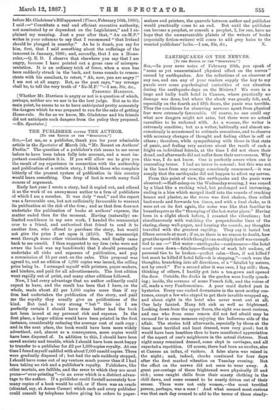MR. HARRISON ON HOME-RULE.
[To Tao Emcee or Tax "SPECTATOR:1 Sia,—The question between "An ex-M.P." and myself is quite- different from that suggested in your editorial note. It is,. whether or not he could fairly say that I "recommend that Ireland should be plunged in anarchy." As he does not seem- inclined either to prove or to withdraw that charge, you cited in his behalf some words of mine, spoken on January 1st, 1886,. before Mr. Gladstone's intentions were known. I reply that in the sentence preceding those words, I recommended "the creation- of a real, distinct, powerful Executive." You reply that I am a. Home-ruler, and therefore recommend a policy which may, in. your opinion, lead to evil. That is a matter of opinion which applies alike to Mr. Gladstone, the late Government, and all in the country who support them. But "An ex.M.P." singled out myself and another Positivist as " recommending anarchy." Do you say that Mr. Gladstone and the whole of his party recom- mend anarchy P We say that the policy which Unionists now- pursue will end in anarchy. But we do not say that all Unionists "recommend anarchy."
I now ask "An ex-M.P.," as an honest man, to prove his. charge that I "recommend that Ireland should be plunged in- anarchy." All that your notes suggest is that I am a Home- ruler. But as to the specific words of mine spoken in January,. 1886, they can have no bearing on Mr. Gladstone's Bill. You now say that I advocated " throwing Ireland into the hands of the Irish democracy." I did precisely the contrary. My address, printed in the Contemporary Review for February, 1886, was directed against the evils of democracy. I wrote in the Times (February 16th, 1 6), that one of the conditions precedent to Home-rule would be to "guarantee the minority against spolia- tion and oppression." Is that the language of a man who is recommending " that Ireland should be plunged in anarchy ?" You now say that I looked forward to a democratic Executive, when it was to be the Executive of a Legislature that was to be democratic. I looked forward to no such thing. Writing before Mr. Gladstone's Bill appeared (Times, February 16th, 1886), I said :—" Constitute a real and efficient executive authority, not nominated by or dependent on the Legislature," and I ex- plained my meaning. Just a year after that, "An ex-M.P." writes in your columns to say that I recommend " that Ireland should be plunged in anarchy." As he is dumb, you say for him, first, that I said something about the sufferings of the innocent in January, 1886; and, secondly, that I am a Home- ruler,—Q. E. D. I observe that elsewhere you say that I am angry, because I have pointed out a gross case of misrepre- sentation. It is an ordinary trick of fence, when a man has been suddenly struck in the back, and turns rounds to remon- strate with his assailant, to retort, " Ah, now, you are angry !" I am not at all angry. Bat, as the poet says, "my revenge shall be, to tell the very truth of ' Ex-M.P.' "—I am, Sir, &c.,
FREDERIC HARRISON.
[Whether Mr. Harrison is angry or not is a question of which, perhaps, neither are we nor is he the beat judge. But as to the main point, he seems to us to have anticipated pretty accurately the dangers which he was prepared to run for the sake of getting Home-rale. So far as we know, Mr. Gladstone and his friends did not anticipate such dangers from the policy they proposed. —En. Spectator.]



































 Previous page
Previous page